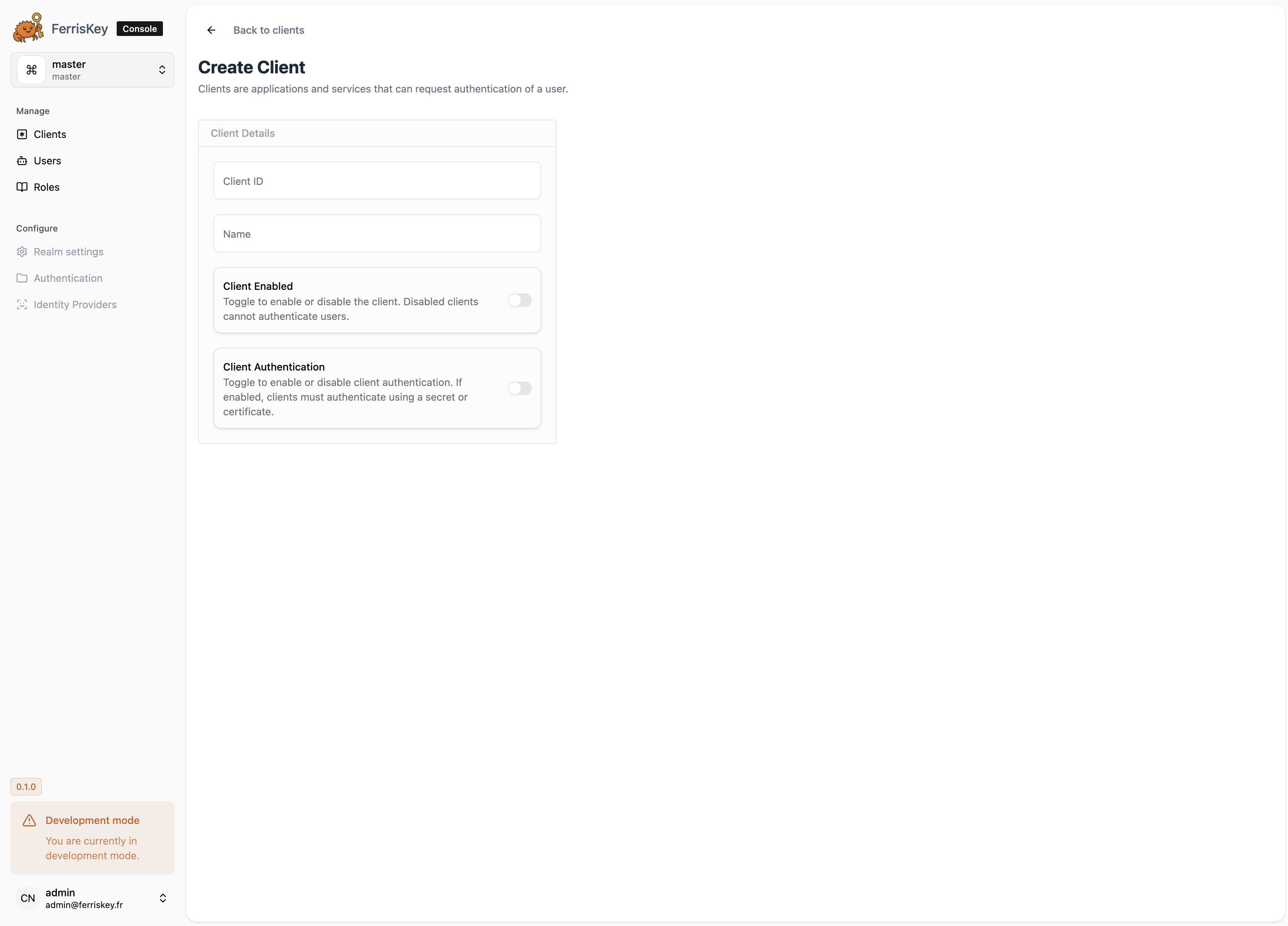In the documentation
Clients
Clients in FerrisKey represent applications or services that interact with your IAM system. Each client is registered within a realm and is assigned its own credentials, roles, and permissions.
What are Clients?
A client is an entity (such as a web app, API, or service) that needs to authenticate and authorize users or itself against FerrisKey. Clients are fundamental for enabling secure access to your applications.
- Unique Credential: Each client has its own client ID and secret for authentication.
- Role Assignment: Clients can be assigned roles that define their permissions within the realm.
- Per-Realm Registration: Clients are registered within a specific realm, ensuring isolation.
- Protocol Support: Supports OAuth2, OpenID Connect, and other standard protocols.
Use Cases
Application Authentication
Register web, mobile, or backend applications as clients to enable user login and secure API access.
Service-to-Service Communication
Secure communication between microservices by registering each service as a client with its own credentials.
Third-Party Integrations
Allow external partners or SaaS products to integrate securely by registering them as clients.
Client Architecture
Registration & Credentials
Clients are registered with a unique client ID and secret. These credentials are used for authentication and token requests.
CREATE TABLE clients (
id UUID PRIMARY KEY,
realm_id UUID REFERENCES realms(id) NOT NULL,
name VARCHAR(255) NOT NULL,
client_id VARCHAR(255) NOT NULL UNIQUE,
client_secret VARCHAR(255) UNIQUE,
redirect_uris TEXT[],
enabled BOOLEAN NOT NULL DEFAULT TRUE,
created_at TIMESTAMP NOT NULL DEFAULT CURRENT_TIMESTAMP,
updated_at TIMESTAMP NOT NULL DEFAULT CURRENT_TIMESTAMP
);Role Assignment
Roles are directly linked to a client via the client_id column, enabling per-client permission models within a realm.
CREATE TABLE roles (
id UUID PRIMARY KEY,
name VARCHAR(255) NOT NULL,
description TEXT,
permissions BIGINT NOT NULL DEFAULT 0,
realm_id UUID NOT NULL REFERENCES realms(id) ON DELETE CASCADE,
client_id UUID REFERENCES clients(id) ON DELETE CASCADE,
created_at TIMESTAMP NOT NULL DEFAULT CURRENT_TIMESTAMP,
updated_at TIMESTAMP NOT NULL DEFAULT CURRENT_TIMESTAMP
);- Per-Client Roles: Each role can be scoped to specific client, or left NULL for realm-wide roles.
- Fine-Grained Permissions: Assign only the necessary permissions to each client’s roles.
Security Best Practices
- Least Privilege: Assign only the required roles and permissions to each client.
- Secret Management: Store client secrets securely and rotate them regularly.
- Redirect URI Validation: Always specify and validate redirect URIs to prevent misuse.
- Audit Logging: All client authentication and authorization events are logged for compliance.
Create Client
To create a new client in FerrisKey, you can use either the web interface or the API. Each client requires a unique name, client ID, and will be registered within a specific realm.
Using the Web Interface
- Navigate to your realm’s client management section
- Click “Create Client” or the ”+” button
- Fill in the required fields:
- Client Name: A descriptive name for your application
- Client ID: A unique identifier (auto-generated if left blank)
- Redirect URIs: Valid redirect URLs for OAuth flows
- Client Type: Choose between public or confidential client
- Configure additional settings as needed
- Click “Create” to register the client

Using the API
curl -X POST "https://your-ferriskey-instance/realms/{realm}/clients" \
-H "Authorization: Bearer {access_token}" \
-H "Content-Type: application/json" \
-d '{
"client_id": "string",
"client_type": "string",
"enabled": true,
"name": "string",
"protocol": "string",
"public_client": true,
"service_account_enabled": true
}'Once created, you’ll receive the client credentials that your application will use for authentication.